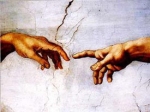Verse Galatians 3:23-24 But before faith came, we were kept under the law, shut up unto the faith which
should afterwards be revealed. Wherefore the law was our schoolmaster to bring us unto Christ, that we
might be justified by faith. KJV
God delivered the people of Israel because He heard their groaning under the oppression of the
Egyptians taskmasters. They did not know God, they did not understand any of His ways, priorities, or
standards of living, but they were heirs according to the covenant made with Abraham many years
before. The people understood slavery and oppression, they knew about the deities of Egypt, and they
understood the pagan ways of the land in which they were brought up. God’s ways are opposed to the
ways of the world, but the ignorance of His ways did not deter Him from helping the people of Israel.
The foundation of their deliverance was based on His covenant. God sets people free from the bondage
of sin on the basis of covenant relationship, not on merit or righteousness on their part.
At Mt. Sinai, after the newly liberated Israelites agreed to do as YHWH asked of them, YHWH gave them
the regulations of Torah (the law). But the “law made nothing perfect” (Hebrews 7:19).
So what is the purpose of the law? It was our schoolmaster (Galatians 3:24). The Torah teaches us of
our own weakness. It is the law that exposes our sin and demonstrates it to us in spite of our best efforts
to overcome it. As the covenant partners of YHWH, sin is a foreign land that still occupies our
consciousness, though we are unaware of its presence until it is exposed. Torah exposes the lie.
The school master.
From the Mirror Word, an original translation of the Bible by Francois du Toit
Romans 7
7 The law in itself is not sinful; I am not suggesting that at all. Yet in pointing sin out, the law was in a
sense the catalyst for sinful actions to manifest. Had the law not said, “Thou shalt not covet,” I would
not have had a problem with lust.
8 But the commandment triggered sin into action, suddenly an array of sinful appetites were
awakened in me. The law broke sin’s dormancy.
9 Without the law I was alive, the law was introduced, sin revived and I died.
10 Instead of being my guide to life, the commandment proved to be a death sentence.
11 Sin took advantage of the law, and employed the commandment to seduce and murder me.
12 I stress again that the law as principle is holy and so is every individual commandment it contains;
it consistently promotes that which is just and good.
13 How then could I accuse something that is that good to have killed me? I say again, it was not the
law, but sin that caused my spiritual death. The purpose of the law was to expose sin as the culprit.
The individual commandment ultimately serves to show the exceeding extent of sin’s effect on
humanity.
14 We agree that the law is spiritual, but because I am sold like a slave to sin, I am reduced to a mere
carnal life. (Spiritual death. The word, piprasko comes from perao, meaning to transport into a distant
land in order to sell as a slave. Sin is a foreign land.)
15 This is how the sell-out to sin affects my life: I find myself doing things my conscience does not
allow. My dilemma is that even though I sincerely desire to do that which is good, I don’t, and the
things I despise, I do.
16 It is obvious that my conscience sides with the law;
17 which confirms then that it is not really I who do these things but sin manifesting its symptoms in
me. (Sin is similar to a dormant virus that suddenly broke out in very visible symptoms.) It has taken my
body hostage.
18 The total extent and ugliness of sin that inhabits me, reduced my life to good intentions that
cannot be followed through.
19 Willpower has failed me; this is how embarrassing it is, the most diligent decision that I make to do
good, disappoints; the very evil I try to avoid, is what I do. (If mere quality decisions could rescue man,
the law would have been enough. Good intentions cannot save man. The revelation of what happened
to us in Christ’s death is what brings faith into motion to liberate from within. Faith is not a decision we
make to give God a chance, faith is realizing our inclusion in what happened on the Cross and in the
resurrection of Christ!)
20 If I do the things I do not want to do, then it is clear that I am not evil, but that I host sin in my body
against my will.
21 It has become a predictable principle; I desire to do well, but my mere desire cannot escape the
evil presence that dictates my actions.
22 The real person that I am on the inside delights in the law of God. (The law proves to be consistent
with my inner make-up.)
23 There is another law though, (foreign to my design) the law of sin, activating and enrolling the
members of my body as weapons of war against the law of my mind. I am held captive like a prisoner
of war in my own body.
24 The situation is absolutely desperate for humankind; is there anyone who can deliver me from this
death trap?
THE LAW (TORAH) LEADS US TO JESUS CHRIST
From the Mirror Word, an original translation of the Bible by Francois du Toit
Romans 7
25 Thank God, this is exactly what he has done through Jesus Christ our Leader; he has come to our
rescue! I am finally freed from this conflict between the law of my mind and the law of sin in my body.
(If I was left to myself, the best I could do was to try and serve the law of God with my mind, but at the
same time continue to be enslaved to the law of sin in my body. Compromise could never suffice.)
Romans 8
1 Now the decisive conclusion is this: in Christ, every bit of condemning evidence against us is
cancelled. (“Who walk not after the flesh but after the spirit.” This sentence was not in the original text,
but later copied from verse 4. The person who added this most probably felt that the fact of Paul’s
declaration of mankind’s innocence had to be made subject again to man’s conduct. Religion under the
law felt more comfortable with the condition of personal contribution rather than the conclusion of
what faith reveals. The “in Christ” revelation is key to God’s dealing with man. It is the PIN-code of the
Bible. [See 1 Corinthians 1:30 and Ephesians 1:4].)
The Spirit is now our Teacher
The fulfillment of the Exodus experience is the sacrifice of Jesus Christ which removes guilt. The
fulfillment of the giving of the written code of the Law is the gift of the indwelling Spirit of Christ that
liberates us from sin’s authority and grants us power to overcome the law of sin and death. The Spirit is
our Teacher and Comforter, who empowers us from the bondage of self-effort towards righteousness.
From the Mirror Word, an original translation of the Bible by Francois du Toit
Romans 8
2 The law of the Spirit is the liberating force of life in Christ. This leaves me with no further obligation
to the law of sin and death. Spirit has superseded the sin enslaved senses as the principle law of our
lives. (The law of the spirit is righteousness by faith vs the law of personal effort and self-righteousness
which produces condemnation and spiritual death which is the fruit of the DIY tree.)
3 The law failed to be anything more than an instruction manual; it had no power to deliver man from
the strong influence of sin holding us hostage in our own bodies. God disguised himself in his son in
this very domain where sin ruled man, the human body. The flesh body he lived and conquered in was
no different to ours. Thus sin’s authority in the human body was condemned. (Hebrews 4:15, As High
Priest he fully identifies with us in the context of our frail human life. Having subjected it to close
scrutiny, he proved that the human frame was master over sin. His sympathy with us is not to be seen as
excusing weaknesses that are the result of a faulty design, but rather as a trophy to humanity. He is not
an example for us but of us.)
4 The righteousness promoted by the law is now realized in us. Our practical day-to-day life bears
witness to spirit inspiration and not flesh domination.
5 Sin’s symptoms are sponsored by the senses, a mind dominated by the sensual. Thoughts betray
source; spirit life attracts spirit thoughts.
6 Thinking patterns are formed by reference, either the sensual appetites of the flesh and spiritual
death, or zoe-life and total tranquility flowing from a mind addicted to spirit (faith) realities.
7 A mind focused on flesh (the sensual domain where sin held me captive) is distracted from God with
no inclination to his life-laws. Flesh (self-righteousness) and spirit (faith righteousness) are opposing
forces. (Flesh no longer defines you; faith does!)
8 It is impossible for those immersed in flesh to at the same time accommodate themselves to the
opinion, desire and interest of God.
9 But you are not ruled by a flesh-consciousness, (law of works), but by a spirit-consciousness, (faith);
God’s Spirit is at home in you. Anyone who does not see himself fully clothed and identified in the
Spirit of Christ, cannot be himself. (If anyone does not embrace the Spirit of Christ, he is not himself.
The word echo means to have in hand, to hold, in the sense of wearing like a garment, to possess in
mind, to be closely joined to a person, and hauto from heauto, reflexive relation, himself, herself,
themselves. In James 1:24, “for he goes away from what the mirror reveals, and immediately forgets
what manner of man he is.” Also in Romans 1:23, “Losing sight of God, made them lose sight of who
they really were. In their calculation the image and likeness of God became reduced to a corrupted and
distorted pattern of themselves.” See also Luke 15:17, “The prodigal son came to himself … .” [same
word used here, heauto].)
10 The revelation of Christ in you declares that your body is as good as dead to sin’s demands; sin
cannot find any expression in a corpse. You co-died together with him. Yet your spirit is alive because
of what righteousness reveals. (The word traditionally translated, “if” de ei, as in “if Christ is in you …”
can either be a condition or a conclusion, which makes a vast difference. If God be for us” (v 31) is most
certainly a conclusion of the revelation of the Gospel; all of God’s action in Christ confirms the fact that
he is for us and not against us. Thus, because God is for us … ” in the same context this verse reveals
that Christ is in us. See Galatians 1:16, “it pleased the Father to reveal his Son in me, in order that I
might proclaim him in the nations.” See also Romans 10:6-8, “Righteousness by faith says … .”)
11 Our union with Christ further reveals that because the same Spirit that awakened the body of Jesus
from the dead inhabits us, we equally participate in his resurrection. In the same act of authority
whereby God raised Jesus from the dead, he co-restores your body to life by his indwelling Spirit.
(Your body need never again be an excuse for an inferior expression of the Christ life, just as it was
reckoned dead in Christ’s death, it is now reckoned alive in his resurrection.)
12 We owe flesh nothing.
13 In the light of all this, to now continue to live under the sinful influences of the senses is to
reinstate the dominion of spiritual death. Instead, we are indebted to now exhibit the highest
expression of life inspired by the Spirit. This life demonstrates zero tolerance to the habits and sinful
patterns of the flesh.
14 The original life of the Father revealed in his son is the life the Spirit now conducts within us. (The
word, agoo, means to conduct or to lead as a shepherd leads his sheep.)
15 Slavery is such a poor substitute for sonship! They are opposites; the one leads forcefully through
fear while sonship responds fondly to Abba Father.
16 His Spirit resonates within our spirit to confirm the fact that we originate in God.
17 Because we are his offspring, we qualify to be heirs; God himself is our portion, we co-inherit with
Christ. Since we were represented and included in his suffering we equally participate in the glory of
his resurrection.
18 He has taken the sting out of our suffering; what seemed burdensome in this life becomes
insignificant in comparison to the glory he reveals in us.
Romans 8
33 God has identified us, who can disqualify us? No-one can point a finger; he has justified us. (He has
placed us beyond the reach of blame and shame, guilt and gossip!)
34 What further ground can there possibly be to condemn man? In his death he faced our judgment;
in his resurrection he declares our innocence; the implications cannot be undone! He now occupies
the highest seat of authority as the executive of our redemption in the throne room of God. (See v 1,
also Rom 4:25.)
35 What will it take to distance us from the love of Christ? You name any potential calamity: intense
pressure of the worst possible kind, cluster-phobia, persecution, destitution, loneliness, extreme
exposure, life-threatening danger, or war?
36 Let me quote scripture to remind you, “Yea, for thy sake are we killed all the day long; we are
counted as sheep for the slaughter.” (Ps 44:22)
37 On the contrary, in the thick of these things our triumph remains beyond dispute. His love has
placed us above the reach of any onslaught.
38 This is my conviction, no threat whether it be in death or life; be it angelic beings, demon powers
or political principalities, nothing known to us at this time, or even in the unknown future;
39 no dimension of any calculation in time or space, nor any device yet to be invented, has what it
takes to separate us from the love of God demonstrated in Christ. Jesus is our ultimate authority.





Terms & Conditions
Subscribe
Report
My comments